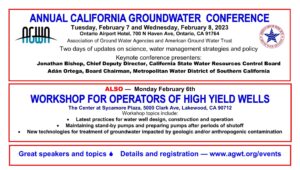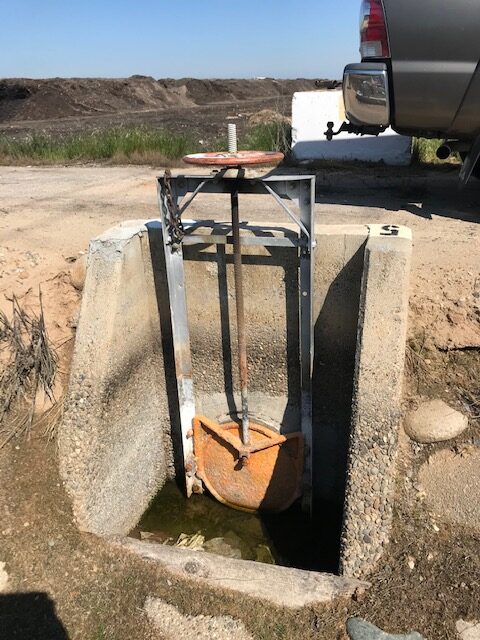Meeting as the Madera County GSA board of directors on January 24, 2023, the county supervisors voted three to two to defeat a proposed three-tier penalty fee structure for farmers who exceed their water allocation. This leaves in place the schedule approved last fall imposing a $100 per acre foot (AF) charge in 2023, increasing $100 each year until it reaches $500 in 2027. They also discussed a credit for emergency water recharge.
Here’s How it Went
Chairman David Rogers convened the GSA board meeting at 10:45 a.m. in the county government center building and on Zoom. The agenda included a resolution requested at the meeting two weeks ago that would have implemented a new, three-tier penalty fee for exceeding water allocations, 27.7 inches of ETAW for 2023 in the Madera Subbasin. The draft resolution would have imposed $100 / AF for those exceeding from one to 15 percent; $250 / AF for those at 16 to 30 percent; and $500 / AF for those going over by 31 percent or more, beginning in the 2023 calendar year. Up for review too was a draft emergency policy for capturing flood water for recharge allowing a credit for water applied. With this agenda, there were some 60 people in the meeting room, with many speaking during public comment.
draft resolution would have imposed $100 / AF for those exceeding from one to 15 percent; $250 / AF for those at 16 to 30 percent; and $500 / AF for those going over by 31 percent or more, beginning in the 2023 calendar year. Up for review too was a draft emergency policy for capturing flood water for recharge allowing a credit for water applied. With this agenda, there were some 60 people in the meeting room, with many speaking during public comment.
Stephanie Anagnoson, county director of water and natural resources, opened with a nine-slide presentation about a new penalty structure. She gave a brief bit of background explaining that penalties are allowed in the water code to provide an incentive for growers to stay within their allocations, or a disincentive for going over. She confirmed the schedule set last September (noted above) setting the penalty at $100 / AF for 2023 and going up $100 each year until 2027. She then presented the good news. In both the Madera and Chowchilla Subbasins, total consumptive use was under the allocation for 2022. She said that growers had anticipated fees and a possible $500 penalty during discussions in 2022 with a resulting fallowing of more land. That said, she pointed out that in the Madera Subbasin, approximately 30 percent of the farm units were over their allocations and in the Chowchilla Subbasin about 40 percent. If the $100 penalty had been in place in 2022, it would have generated $1.1 million.
She went on to show that 60 farm units with 20,000 irrigated acres were over by one to 15 percent, 30 farm units with 7500 irrigated acres were over between 15 and 30 percent and 28 farm units with 5000 irrigated acres were over by more than 30 percent. With no names used, she presented a slide showing the profiles of the ten farm units going over their allocation by the highest percentages. Total irrigated acres ranged from over 746 to 33, mostly almonds but with one farm unit each with some pistachios and wine grapes and one with citrus. In this group, the percentage of water exceeding the allocation was as high as 59.7 percent. She said she had talked with one grower in this highest group who said a staff person who had not monitored water use had been replaced. She said several others she talked with said they just didn’t know about the requirements.
With these figures in mind, she said she was proposing three “buckets.” She said it’s reasonable to assume that those exceeding by 15 percent or less are trying to stay within the allocation. She said that for the next two higher groups, it appears the $100 penalty is a really great price for water. She cited the $200 / AF price for water for recharge being offered by irrigation districts. She said that going forward the staff would meet with everyone at the higher tiers.
She presented information about the penalty schedules currently in place in six other neighboring GSAs, several of which had tiers and all with a $500 / AF at the highest tier. She said we want growers to manage within their allocations, with no penalty needing to be paid. She said if the proposed three tier program had been in place for 2022, it would have resulted in over $4 million, most of which could be used for domestic well mitigation. She concluded here and invited questions from the supervisors.
At this point, 11:00 a.m., there was a 15-minute recess to fix a Zoom problem with the Spanish translation, before Supervisor Letitia Gonzalez asked about the slide showing penalties imposed in other GSAs. She referenced the $1000 penalty imposed by one. Anagnoson replied that GSAs can impose a penalty but may also institute a charge for water replacement and a reduction in the allocation. Gonzalez also asked about how many inches of ETAW were represented in the percentage excesses shown in the slide presentation. Anagnoson did not have that information immediately at hand.
Referring to penalties in other districts, Supervisor Rob Poythress pointed out that there are limits to what people can pump. He thanked all the people who had stayed under their allocations. He then noted that under the new proposal those who move into the lowest tier, 15 percent and under, will continue to pay $100 / AF, with no annual increase, while under the current regulation, those in the lowest tier will move up to $500 in the future. He said if he could adjust the tiers proposed, he would reduce the percentages each year so that in six years there would just be a flat $500 / AF penalty, which is in the spirit of what was done originally.
Supervisor Jordan Wamhoff said thanks for this data. He said it appears to him that there is an education issue. He said we are working with a new process. He continued, saying, “I think it’s important that we don’t move the goal posts on these growers.” He said it’s already stair stepped with the penalty going up $100 per year. He concluded saying he wants to keep the rates as they are.
Chair Rogers asked about contact with growers who had gone over their allocations and was told by Director Anagnoson she had only talked with those in the highest group. He also asked about surface water used by growers and was told there had been no discussion of surface water. He said he knows of cases where surface water was delivered. He continued saying that we haven’t even seen a full season and it appears everyone is making an effort. He said that maybe some of this has to do with education. His philosophy, he said, is that government should be on the side of the citizen taking the least onerous approach. He said that farmers have made these changes in a drought driven year and that we don’t want to move too quickly to solve this water problem. He said market forces are already working against almond growers with three years of inventory at fire sale prices. Many may have to go to other, non-permanent crops. “Stay the course,” he concluded.
Director Anagnoson replied showing the slide indicating the penalty stays the same for the majority of people, while setting the bar higher for the 30 farm units in the middle tier and the 28 units in the highest. She used a speeding ticket analogy, pointing out the more you exceed the speed limit, the higher the fine. She said the proposal only raises the penalty for those who are beyond 15 percent of their allocation. She said, “At some point, they are being deliberately ignorant.”
At this point, public comment was invited, and local grower Mark Peters led off saying that his operation had been slightly over its allocation in 2022 but will be under in 2023 because we took action. He said the only new data you have is that the subbasin is under its allocation. If you vote for new penalties, you run the risk of further alienating the farming community. He said making this change in January is just a money raising effort.
Nataly Escobedo Garcia introduced herself from the Leadership Counsel for Justice and Accountability. She said she and her organization support higher penalties for those who significantly over pump and that there should be funding for domestic well mitigation.
Next was Maria Castillo, speaking in Spanish whom we understood through a translator. She said she and her husband have two children and one income. Their well has gone dry and to dig deeper will cost $40,000 which they can’t possibly afford. She explained that while they are under a program to receive water, it’s not enough for their family and she asks for help getting clean water. Earlier during the comment period for the supervisors meeting, she had made this same plea.
A real estate broker from the Rolling Hills area of Madera County, Benjamin Martin said the board had heard that farmers are trying to fix the problem and now the “long arm of the government through an unelected bureaucracy is trying to find new revenue streams.” He said it’s an illegal tax, whether you call it a penalty or not. “Remove these money hungry vultures,” he said. He concluded his impassioned comments saying, “Science has proven we don’t have a climate issue and if you don’t do what’s right to protect your farmers, I’ll run against you.”
Christina Beckstead, executive director of the Madera County Farm Bureau, was next noting, “That’s a tough act to follow.” She asked if there had been a final summary of Irriwatch information. She said she thinks a margin of error should be allowed before penalties are imposed because of the Irriwatch adjustments made last fall. Referring to his comments earlier, she said Supervisor Poythress wants to be sustainable in five years, not the 15 years that SGMA allows. “Let’s make sure we have time to implement programs adequately and appropriately,’ she urged. She also pointed out an inaccuracy in the language of the proposed resolution regarding the Chowchilla Subbasin, which should be corrected if the motion was to be approved.
Next were four citizens of Fairmead, a small community east of Chowchilla which is known to have significant problems with domestic wells. The first speaker whose name we didn’t catch said that since almonds had been planted near her that she has had no water. She said if farmers aren’t under the limit, we can’t have wells that won’t go dry. She said the sooner you get it under control, the sooner we can have water. Next, Diane Williams asked if there was any way to know the farmers’ schedules of watering. She explained that when irrigation is going on, she can’t flush her toilet much less wash her clothes. She said we need to work together but the community is more than farmers. Also from Fairmead, Caroline Williams said she moved to her family’s property in 1981 but now she’s a property owner with no water. She said she has had one well go dry and has dug another. She said she wanted to be clear that we support the resolution to penalize at a higher rate. Put a penalty on those who have been irresponsible, she urged. Do what you need to do to protect those who are within the guidelines, she said. Barbara Nelson also in Chowchilla said she wants to save her well. She says every year in Fairmead we can’t do anything with water. She said, “We know almond farmers have to make a living but we need to be protected. We hope you consider protecting us, too,” she concluded.
asked if there was any way to know the farmers’ schedules of watering. She explained that when irrigation is going on, she can’t flush her toilet much less wash her clothes. She said we need to work together but the community is more than farmers. Also from Fairmead, Caroline Williams said she moved to her family’s property in 1981 but now she’s a property owner with no water. She said she has had one well go dry and has dug another. She said she wanted to be clear that we support the resolution to penalize at a higher rate. Put a penalty on those who have been irresponsible, she urged. Do what you need to do to protect those who are within the guidelines, she said. Barbara Nelson also in Chowchilla said she wants to save her well. She says every year in Fairmead we can’t do anything with water. She said, “We know almond farmers have to make a living but we need to be protected. We hope you consider protecting us, too,” she concluded.
Next up, Ralph Pistoresi, local grower and outspoken leader of the group that has obtained an injunction against the 281 fees, turned to the Fairmead folks. He said he had a solution for their problems. He offered to put a 5000-gallon tank on each of their properties and fill it up. He then turned to the supervisors and began citing examples in other counties of large farms going out of business because, he claimed, of water penalties imposed on them. He said what’s going to happen here has to be considered. He said just the mere fact of what you are considering sends a message to financial people that they can’t depend on anything in Madera. He said you’ll devastate this county and the people with it. He finished saying, “We must defend our property rights including the ladies who spoke.”
Mark Nakata of the California United Water Coalition said he wanted to speak about property values which he said are dropping rapidly across the Valley because of the imposition of these groundwater rules. He said farmers should ask for reassessment of their property values and pay lower taxes. He said we should have been working on flood water access this summer because it takes months to get a permit. “We were,” interjected Chair Rogers. Nakata said that 300,000 acre feet daily are going from the Sacramento River into the ocean and that water is not being put into the San Luis Reservoir. He said we should push back against the state. They created the problem, he said, and we’re left to clean up the mess.
Calling in on Zoom, Devin Aviles, a grower and farmer cooperative manager in the county, said he felt the big reason people cut back in 2022 was because a $500 penalty had been discussed earlier in the year, before September. He said in 2023 you don’t have a very high penalty and no GSP fees either. He predicted there will be a much bigger deficit this year. He’s even heard people say the state should come in. He concluded, “Lower penalties aren’t in the long term best interest of the GSA.”
The final speaker in the room was Markhan Singh, a white area grower. He said land prices are coming down and so will property taxes. Bankrupt farmers will move somewhere else. How much money will be lost? How many jobs? Processors will be gone. It’s not just a problem for farmers but also for their employees and the businesses that support them. You have to think properly and positively.
At 12:15 with no further public comment, Chair Rogers invited the supervisors to respond. Supervisor Poythress said that bankers have been talking about water and property values since before 2015. White area lands were identified very early because of not having enough water. He said Christina [Beckstead] had mentioned our glide path is going forward quickly but, nothing has changed over the past several years on this path. The reduction in allocation is two percent per year for the first five years and then six percent per year after that, giving people time to adjust. What we’re here for, he said, is to manage the basin that is becoming depleted. Nobody pays a penalty of you’re within your allocation. I believe if we don’t do something, we are disrespecting the farmers who have made the adjustments to stay under their allocation. Right now, he said, the small minority who are grossly over pumping are being favored, in effect, if we do nothing. We cannot play favorites. A speaker at the last meeting [January 10] said the $100 penalty on land he wanted to lease was not a disincentive but at $500 he would not lease the land or plant. He said that right in front of us. Because it penalizes those who are grossly over pumping, he favored the staff proposal [for tiered rates.]
Chair Rogers said Stephanie’s numbers show that in general and in total we are under our allocation. Anagnoson replied that we have a lot of farm units who are over. Rogers confirmed that next year, 2024, the penalty moves to $200.
Supervisor Wamhoff says we are just at the beginning of this process and there is still uneasiness with Irriwatch. He does not favor moving the goal posts that were set in September. He said people will calibrate and will remain under their allocation. He said it is clear the state hasn’t done what should be done and it behooves us as elected officials to lobby for correct action. We are within our allotted time frame to get to sustainability. There is obviously a domestic well situation and those penalties should go to the mitigation program. He agreed with Beckstead that there should be a variance allowed.
Chairman Rogers supported a variance saying the Irriwatch concerns are like the police using a radar gun that is not calibrated. Are they really going over the speed limit? In one of the driest years on record, he said, you [local growers] stepped up to the plate. Supervisor Gonzalez said she likes the tiered phase to be fair to the people who have made the changes. Supervisor Macaulay then said that we should not be moving the goal posts at this time. He said there is a need to find consensus with farmers to bring more water into the county.
With that, Poythress made a motion seconded by Gonzalez to approve the resolution implementing the proposed three-tiered penalty schedule. At that moment, local business owner Mike Alamari was allowed on Zoom to comment. He said he agreed with Pistoresi’s comment that when the Fed even considers raising interest rates, there is a reaction in the business community. He said if changes are to be made, they should be made in 2024. He referenced his January 10 comments about leasing land and said he had made his decision based on the September action of the board. He said rules are being changed after they’ve been agreed upon.
No more comment was forthcoming so at 12:38 p.m., a roll call vote was called with Poythress and Gonzalez in favor and Macaulay, Wamhoff and Rogers opposed. With the failure of the motion, the current plan remains in place. Rogers encouraged everyone to remain on the path to reductions [in water use]. He suggested that farm organizations reach out and encourage their members to stay within their allocations.
Emergency Recharge Policy Discussion
With the penalty question settled, attention was turned to the next agenda item, “discussion and consideration… adopting a policy for Groundwater Recharge Credit in the three subbasins – Chowchilla, Delta-Mendota and Madera.” This would be an emergency recharge policy in light of the rainfall and flooding occurring in the GSA areas.
Director Anagnoson opened with a presentation. She described two rounds of grant funding applied for under Proposition 68. The totals are $7.4 million covering some 760 acres of ag land in the Chowchilla Subbasin for Flood-MAR projects along the Eastside Bypass. (I learned that Flood-MAR is “flood water managed aquifer recharge.”) In the Madera Subbasin, it was over $4.7 million for 5,100 acres of ag land. She continued saying that with 2023 off to a wet start, landowners along the Bypass are eligible to take water for flood relief but there is no legal basis yet to generate a credit against their allocation. She said county staff has had meetings with DWR to expedite water rights applications. Unfortunately, even though flood waters are “extra” they are not treated that way. She said Merced has received a temporary urgency permit to have regulatory relief and Madera is asking for the same relief.
She said the key components of a 2023 “Temporary Emergency Recharge Policy” would be to allow a 75 percent credit for water applied to be used in one year. The water must be lawfully obtained, and it would be retroactive to January 1, 2023. The landowner would be responsible for conveyance, permit compliance and easement acquisition. She said metering would be required. She said the early feedback has been that there should be a higher percent credit, an opportunity to use the credit beyond 2023 and recognition of expediency by county staff. Subsequent comment from the supervisors and the public described below emphasized those points.
Chair Rogers said this is an emergency policy so it’s not a final, long term policy. He said [in some cases] you can recharge more than your allocation. He said this is our future and it can happen. He said the policy is “too heavy, onerous.” The state is in the way he said. For example, fish screens off Bypass turnouts shouldn’t be required because there are no fish in the Bypass [because water flows are seasonal.] He advocated an 80 percent credit and a roll over from year to year. He said property owners need incentives. He thanks Anagnoson for her work to date.
Supervisor Wamhoff asked what the cost is for permits. The reply was in some cases $2,500 or so. It was said the best way for those with access to irrigation district conveyance is to buy that water, with no permit required.
Public comment was invited and first to the podium was Larkin Harmon, a grower and leader in the Triangle T Water District. She said that organization is allowing a 90 percent credit because it’s very costly for the landowner to run the pumps and hire the labor to do so. She said the credit should be allowed to rollover to multiple years. She also advocated what she called a free market approach with owners being able to buy and sell credits within the basin.
Dairy farmer Larry Pietrowski said he is 100 percent in favor of recharge but that state permits start at $6,000. He then commented on particular points in the draft policy document that was included in the supervisors meeting packet and available to the public. He pointed to item 2h. which requires that water be put to a beneficial use in calendar 2023 and then stated that the State Water Board has said that recharge is not a beneficial use. He called attention to item #5 which says that “no on-farm recharge shall occur in Dairy Land Application Areas unless the landowner has provided notification and received concurrence from the Central Valley Regional Water Control Board.” He said this process would take months which is not an emergency. He called the policy draft a “feel good proposal” and said no one would be able to recharge, meaning getting credit for the recharge.
Karun Samran, a Chowchilla area grower, said that carry over should be allowed. If we build the facilities on our property, we have to be able to take the water off over three or four years.
Mark Peters called the policy restrictive and says it pits farmers against the board. He said the expensive plans that were proposed are at a standstill in Delta-Mendota and Madera because of the injunction. He said it should be considered how can we do this together. He asked the board to think about the bigger picture.
Ralph Pistoresi thanked the board for “not increasing the penalties.” He then said that flooding was occurring because the creeks are “broken,” explaining that DWR restricts streambed cleanouts. He said he farms in LeGrand and in Semitropic Water Storage District which allows a 90 – 10 credit.
Christina Beckstead spoke saying Farm Bureau has commented to the state that the Bypass is not a stream, but DWR won’t accept that. She said Planada was flooded because the streambeds were not clean.
Speaking online, Noah Lopez of MAWA thanked the staff for the draft policy and called attention to the five-page letter dated January 22 MAWA had submitted with their comments. He said his group supported a credit larger than 75 percent and favored allowing a multi-year rollover.
With no further comment, Chair Rogers said this item [the draft policy] would continue at another time. He said a number of interesting items had been presented by the public. Director Anagnoson said this policy is similar to Merced’s. And at 1:30 p.m. the board recessed for lunch and then other business.
DISCLAIMER OF RESPONSIBILITY: Waterwrights strives to provide clients with the most complete, up-to-date, and accurate information available. Nevertheless, Waterwrights does not serve as a guarantor of the accuracy or completeness of the information provided, and specifically disclaims any and all responsibility for information that is not accurate, up-to-date, or complete. Waterwrights’ clients therefore rely on the accuracy, completeness and timeliness of information from Waterwrights entirely at their own risk. The opinions expressed in this report are those of the author and do not represent any advertisers or third parties.
ALL RIGHTS RESERVED. Copyright 2023 by WaterWrights.net
Madera County is comprised of three subbasins, designated by the CA Department of Water Resources as critically overdrafted, and “high priority”: (1) the Chowchilla Subbasin; (2) the Madera Subbasin; and (3) a portion of the Delta-Mendota Subbasin. Each of these subbasins submitted a Groundwater Sustainability Plan (GSP) by January 31, 2020. These subbasins are required to achieve “sustainability” by the year 2040. The method by which sustainability will be achieved will be illustrated in the GSP, which was be drafted in partnership by the irrigation district, water districts, cities and Madera County. The Madera County Groundwater Sustainability Agency (GSA) is administered by the Madera County Department of Water and Natural Resources: Stephanie Anagnoson, Director, 200 W. Fourth Street, Madera, CA 93637, (559) 675-7703 x. 2265 or (559) 675-6573. The County of Madera Board of Supervisors is the Board of Directors of the GSA for the three subbasins. The current board is composed of five members: David Rogers, chair, Letitia Gonzalez, Robert Macaulay, Robert Poythress and Jordan Wamhoff.






























